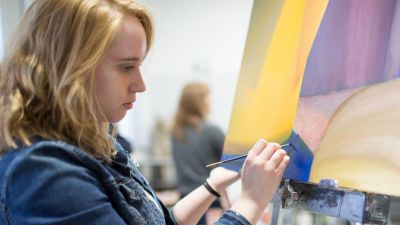
B.A. Art Therapy
With a degree in art therapy from Concordia University, Nebraska, you can help your clients heal physically and mentally using art. Painting, drawing, sculpting and other forms of art increase dexterity in patients with physical disabilities, and art can function as a therapeutic release to help people become more emotionally healthy. By employing a combination of studio art, psychotherapy and counseling, art therapists guide their patients toward a healthier and happier life.
A degree in art therapy provides you with a quality foundation for you to use your creative process to help people of all ages improve their health and emotional well-being. After earning a master's degree and fulfilling post-graduate art therapy experience requirements, you can work in schools, nursing homes, prisons, hospitals, recreation facilities, mental health hospitals and nonprofit agencies. Or you may choose to work with other medical professionals to create a treatment plan for patients who may benefit from art therapy in addition to more traditional remedies.
Credit hours listed above are the minimum required for graduation. Specific program credit hours may vary.
Help your clients heal through art!
Program Highlights
WHY STUDY ART THERAPY AT CONCORDIA?
The art therapy program at Concordia University, Nebraska prepares students seeking to apply to graduate school in art therapy. The art therapy degree provides a quality foundation for students to use the creative process to help people of all ages improve their health and emotional well-being, while encouraging traits students will need to become successful art therapists: compassion, empathy and kindness. With a degree in art therapy from Concordia Nebraska, students will improve their understanding of artistic media, interpersonal skills and human behavior.
Learn more about art at Concordia.
Art Club
Art Club is a student-led group that provides an opportunity for students to come together in a community outside of the classroom setting to engage in conversation on different ideas happening in art.
MEET OUR EXPERT FACULTY
As experts in art therapy, our faculty and instructors bring years of experience to the classroom.
Meet our students
“One of my goals in life has always been to help people. By majoring in art therapy and studio art, I get to work towards making that goal my career while developing myself as an artist. My professors and classmates are constantly encouraging me and pushing me to be better, which has helped me to grow so much as an artist. ”
Celia Askelsen
Indianola, Iowa
Accreditation
Concordia University, Nebraska is accredited by the Higher Learning Commission, a regional accreditation agency recognized by the U.S. Department of Education.
Degree Goals
A studio art program graduate from Concordia University, Nebraska will be able to:
- Acquire broad art therapy knowledge, skills and values based in psychotherapy, psychology, art processes, creativity and trauma counseling.
- Engage in clinical and studio work with insight, self-awareness and a high level of professional, ethical and relational expertise with diverse local and international communities.
- Cultivate their identities as art therapy leaders, artists and advocates.
- Continuously deepen self-understanding through personal growth experiences, reflective practice and personal creativity to promote well-being and guide professional practice.
Art Minors
- Studio Art
- Art History
- Graphic Design
- Self-Directed
Career Outcomes
Art Therapist
- Integrate visual art and the creative process with counseling and psychotherapy techniques to help people process mental and emotional difficulties, substance abuse and other trauma
- Help clients express their emotions and learn to deal with mental or physical stress or increase dexterity and flexibility
Art Professor
- Teach students at the university level
- Help students find their passion and hone their art skills
FAQs
What is art therapy?
Art therapy is a profession that combines psychology and art. An art therapist utilizes art processes as a form of communication, helping clients express their interests and concerns through imagery, rather than verbal communication. Many art therapists use art to reconcile emotional conflicts or foster self-awareness and personal growth. Art therapy can also be used to help patients with physical difficulties increase their dexterity and strength.
Where do art therapists work?
Because of the universal nature of creative expression, many different populations can benefit from art therapy: individuals, groups, families and larger communities. Art therapists typically work individually and as part of clinical teams in mental health, rehabilitation and medical institutions. They may also work in community outreach programs, wellness centers, schools, nursing homes or in independent art therapy practices.
What kind of certification do I need to practice art therapy?
Art therapists are required to be certified by the Art Therapy Credentials Board (ATCB). After earning a master's degree and fulfilling post-graduate art therapy experience requirements, new therapists are eligible to earn a credential to become a registered art therapist (ATR). Registered art therapists may also choose to take a written exam administered by the ATCB to become board certified, which is a more advanced credential. Requirements for private art therapy practices vary by state; some states require individual licensing.
Related Programs

Art Education
A degree in art education from Concordia University, Nebraska gives you a broad range of skills with studio- and design-based courses that provide models for both learning and leading in a classroom. Coupled with course work in art history, you will gain exposure to a variety of media, technology and art methods, all of which prepare you to be an art educator in a classroom or any number of other settings.

Studio Art
A degree in studio art from Concordia University, Nebraska is a degree in critical thinking, visual and spatial reasoning and creative problem solving. Through a sequence of studio and design courses, you will be introduced to a wide range of materials and procedures from basic two- and three-dimensional media to multi-disciplinary experimentation. Through historical and theoretical content, you can engage with art’s critical discourse. Here, you can make connections across disciplines and learn how to use visual language to express your ideas, make social commentary, effect change and celebrate beauty. A studio art degree from Concordia Nebraska will help you not only achieve personal fulfillment through creative expression, but also give you the framework to be a professional within the art field.

Psychology
The bachelor’s degree in psychology at Concordia is ideal for students seeking a strong theoretical foundation in the field of psychology. Offering a diverse psychology curriculum, Concordia Nebraska’s psychology professors use approaches that range from the scientific to philosophical and the experimental to the theoretical.

Pre-Social Work
Concordia University, Nebraska’s pre-social work program is designed to prepare you for success in graduate school and your eventual career in social work

Behavioral Science/Sociology
In Concordia’s behavioral science program, you will study a combination of sociology, psychology and other social sciences to examine complex problems of human interaction and behavior. With this degree, you will gain skills that can be applied in many professions that require an understanding of people and their interactions from individual, group and societal levels.
1 Recent graduates attending graduate school or employed within six months of graduation.
2Average Class Size for Representative Subject Most Aligned with Major, Over Last 5 Years.